A few weeks ago I had one of the scariest nights of my life. My son was briefly hospitalized, and my wife and I were told he would probably have to have his appendix taken out. The idea of someone cutting open my little guy terrified me, not the least because I knew he wouldn’t really understand what was happening, and I got very little sleep sitting in that hospital chair. The story had a happy ending, fortunately. In the morning the doctors reexamined him and determined that the discomfort he was feeling was not caused by his appendix after all and was most likely a particularly nasty viral infection, and we were sent home later that day. But the night before was horrifying. I want to tell you, though, about the bright spot. That actually came early on in the process: Eddie had been sick all day and in the afternoon began throwing up with alarming frequency, prompting me to take him to urgent care. There, the doctor on call examined Eddie and advised me to take him to the emergency room.

Those two words, “emergency room,” sent me into a total PANIC. I started to tremble. My hands were shaking as I texted my wife, who was at work, to meet us at the hospital. I was shaking harder when I searched for the hospital with the Pediatric ER on Google Maps – this despite the fact that I myself was a patient at that same hospital some years ago, and I knew perfectly well where it was. At that moment, though, I didn’t know much of anything and I could feel myself babbling, with questions spilling out of my mouth as frequently as Eddie gives them to me on a good day. At that moment the doctor seemed to realize that – right then and there – his primary patient wasn’t the one in the most need of immediate care. He put his hand on my shoulder and said, “Hey, I have kids too. He’s going to be okay. Nobody knows the pressure on a dad, do they?”
I could have cried right then and there. If I didn’t have to get Eddie into the car to take him to the ER I probably would have. But that moment of strength and compassion from this doctor meant more to me than I could have possibly told him, because he’s absolutely right. Society has bizarre and, frankly, contradictory expectations of fathers. On the one hand, we are often seen as the “disposable” parent. Mothers are considered primary caregivers, stores and restaurants frequently neglect to put diaper changing stations in the men’s restrooms, in custody battles the final decisions overwhelmingly favor the mother, and never once has anyone seen my wife with our son and asked if SHE was “babysitting.” On the other hand, fathers are expected to be the provider, to give the family everything that is needed, to push their own needs aside up to and including their mental health, and to never, EVER allow a crack in the armor to show lest it be revealed that they are anything less than a demigod who always has it together and can do anything all by themselves and make everything turn out in the end. It’s a cocktail of unreasonable expectations and toxic disrespect.
This is not to say that it’s easy to be a mother, of course – nothing could be further from the truth. Moms are looked upon as the nurturers and the caregivers, the emotional core of a family, and there is an immense amount of pressure associated with that role. The difference, to me, is that mothers are usually (justly) celebrated for their contributions and sacrifices, whereas fathers are made the butt of jokes. Think about the difference in our respective holidays. On Mother’s Day, flower shops are emptied, restaurants are packed, and everyone reminds you to celebrate Mom. On Father’s Day, the punchline is about which crappy tie Dad will be given this year.
My wife is wonderful. My wife couldn’t be more supportive. That’s not where this pressure comes from: it’s all about the pressure that we’ve been told all of our lives to bring on ourselves.
All of this is to say that Bandit Heeler is the best father on television.

I shall try to keep my statements in praise of Ludo’s cartoon Bluey brief, but in case you don’t know, Bluey is an Australian cartoon about a family in Brisbane, Australia: six-year-old Bluey Heeler (seven after a birthday episode), her little sister Bingo, their mother Chilli, and their dad, Bandit. Creator Joe Brumm based the show on his own daughters and the way they used to play when they were little, and the majority of episodes focus on the games the children play and the way their parents (and, often, other assorted grownups) get sucked into the amazing fantasy worlds they create. The fact that the Heelers and the rest of the sentient inhabitants of this universe are all dogs is of utter irrelevance.
Over the course of three seasons and over 150 seven-minute episodes, Bluey has become that rarest of phenomenon: a show that is loved by children, but absolutely adored by parents. Bandit and Chilli love their children completely, and what’s more, love each other just as much, and none of the Heelers are shy about showing it. In an era where so many TV families are made up of characters who seemingly can’t stand each other and remain together only because of a vague description of “family” that the thesis of the show often works to destroy, the Heelers are, to put it bluntly, Squad Goals. And Bandit in particular is the father that every father who watches it wants to grow up to be.
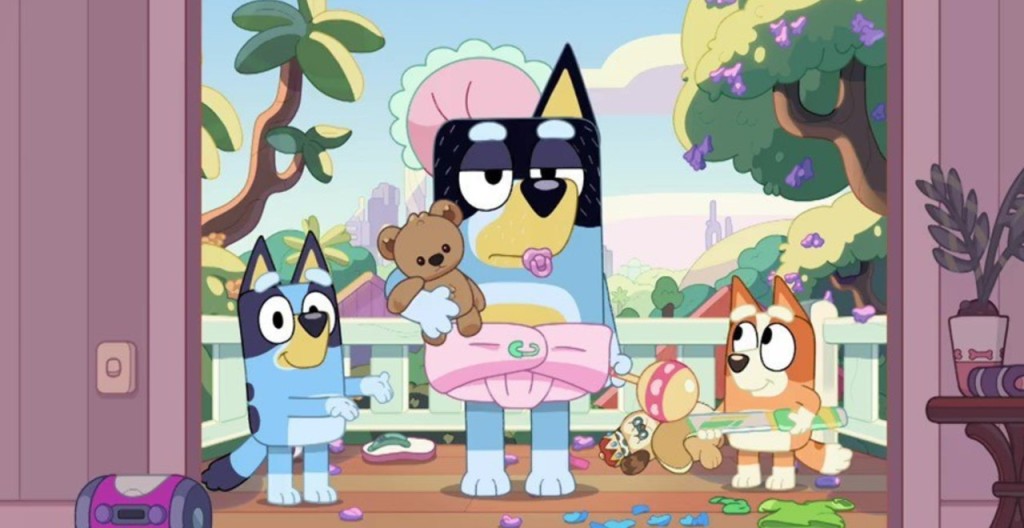
TV dads, historically speaking, have largely fallen into one of two categories. In the early days of TV they were bland, plastic paragons of virtue like Ward Cleaver or Ozzie Nelson. Even by the 70s, when shows were beginning to allow a bit more of an edge, Howard Cunningham from Happy Days was a faultless (if loving) font of strength. Then a switch flipped and dads went from being carved out of marble to sculpted out of mud. TV dads in the 90s and 00s were buffoons. Either they were obnoxiously indifferent to the needs of their children like Al Bundy, or they were so stupid and vapid that they should probably, legally, not be allowed to have a child in their custody without adult supervision. Even the best dads of this era, like Home Improvement’s Tim Taylor, may have genuinely loved their kids, but were also often dangerously negligent in their actions and did incredibly boneheaded things in the name of comedy. It was good for a laugh, sure, but awful for the portraiture of dads in pop culture.
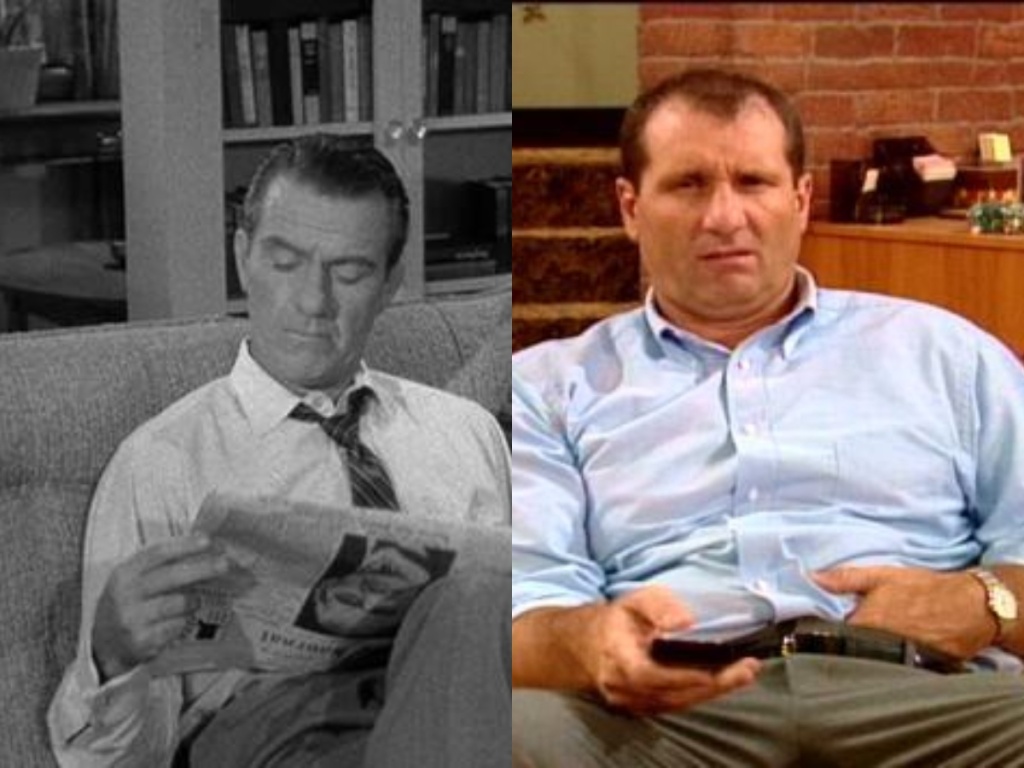
(In the interest of painting a comprehensive picture I should mention that there WAS at least one great TV dad of this era, Heathcliff Huxtable, but real world circumstances have sadly made it virtually impossible to look upon him as a role model anymore.)
Bandit isn’t an idiot. He’s often a step ahead of his kids, playing their games but also using them to teach. In the episode “Bikes,” for example, he has Bluey observe the kids around them to learn perseverance, whereas in “Hotel” he teaches her how to compromise with her sister. Bandit is willing to become whatever is needed to keep the kids happy, and not even just his own kids. In “See-Saw,” he realizes that Bluey’s friend Pom Pom is feeling excluded because she’s so tiny (she’s a Pomeranian, you see, a small but hearty breed), so he sets himself up as the villain, sitting on the titular see-saw and refusing to budge until Pom Pom gets a chance to “save the day.”
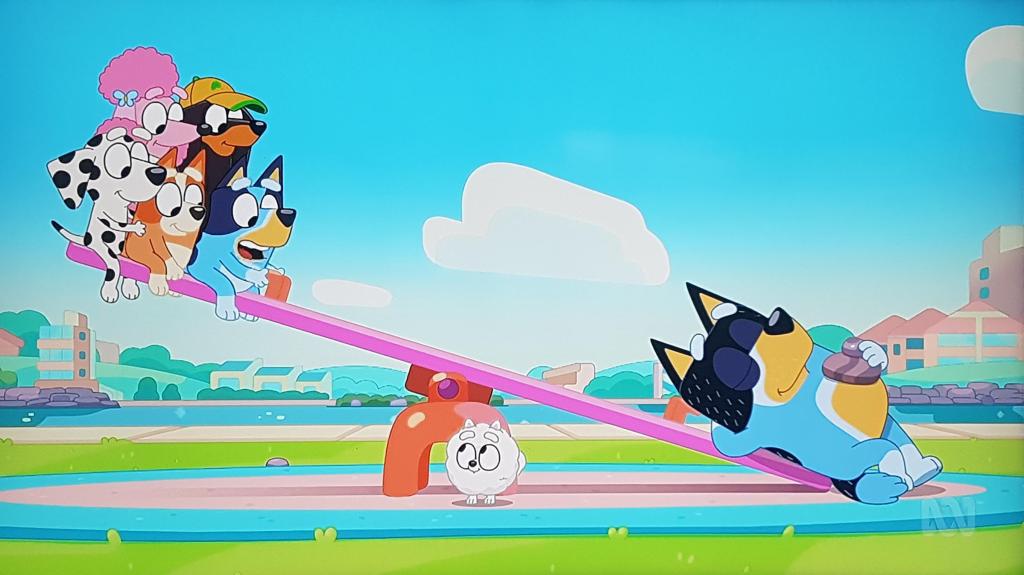
He’s a fantastic dad, but…and this is the most important part…he is not flawless. “Magic Claw” is about trying to teach his girls the value of hard work, only to have his efforts hilariously collapse around him as all they’re really interested in is playing the game. (There’s a great line in this episode where he says that the girls are learning a lesson AND cleaning the house at the same time, only for Chilli to snarkily reply, “Neither of those things are happening.”) In “Ice Cream” the girls each want a lick of the others’ dessert but spend so much time prevaricating over how big a lick they’re allowed to take that their ice cream melts away. Bandit hopes they’ll learn a lesson from this but, like a dad, he feels bad for them and winds up giving them his own ice cream instead.
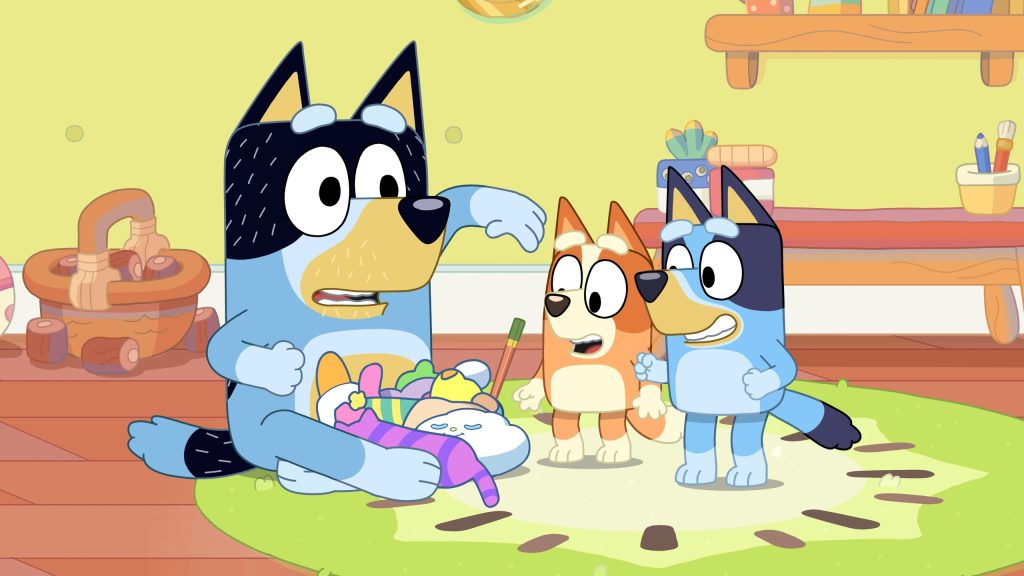
And sometimes, the world gets to Bandit. In “Stickbird,” as the family plays on the beach, Bandit is completely preoccupied. Something is quite clearly bothering him and he’s struggling so badly that he’s not entirely present for the childrens’ game. Although the show never tells us what, exactly, is eating at him, every father who watched that cartoon saw themselves that day. We don’t know why Bandit is struggling, but we DO know that he’s trying to contain himself for the sake of his family, and I don’t know if I’ve ever felt so seen by a TV show.
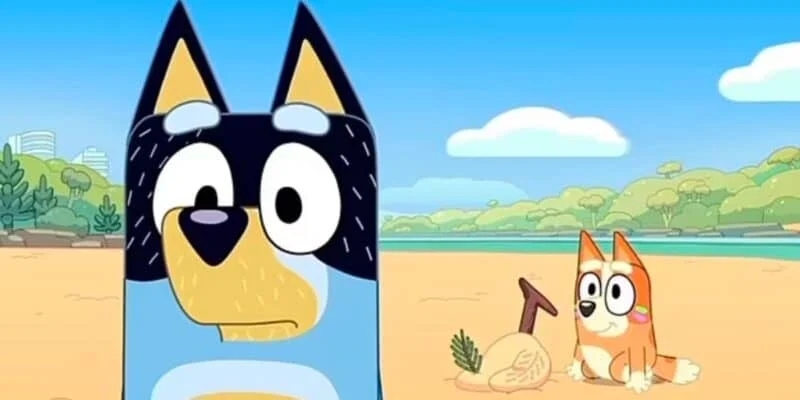
Many fans feel like the “Stickbird” mystery, the question of what was bothering Bandit, was solved in the most recent episode, the quadruple-length “The Sign.” I’m going to spoil “The Sign” now, so stop reading if you’re trying to avoid it, but I feel like pretty much everybody who cares has already seen it. And those who have seen it know that in this 28-minute blockbuster, Bandit Dadded the hardest he has ever Dadded.
In “The Sign,” the Heelers are planning to sell their house and move because Bandit has found a new, higher-paying job in another city, which he says multiple times throughout the episode will allow him to give his children a better life. Already, every dad in the audience is nodding in understanding. The trouble is that none of the Heeler women want to move. Chilli puts on a brave face, but you can tell that she’s upset, Bluey openly campaigns against the move, and Bingo is perfectly happy with the whole thing until Chilli realizes that she doesn’t actually understand what “selling our house” means, after which she is devastated. Bandit struggles through the whole episode with this decision, believing that moving will mean a better life even though the message is clear that the rest of the family is happy with the life they have and they don’t want to chase some abstract idea of “better.”
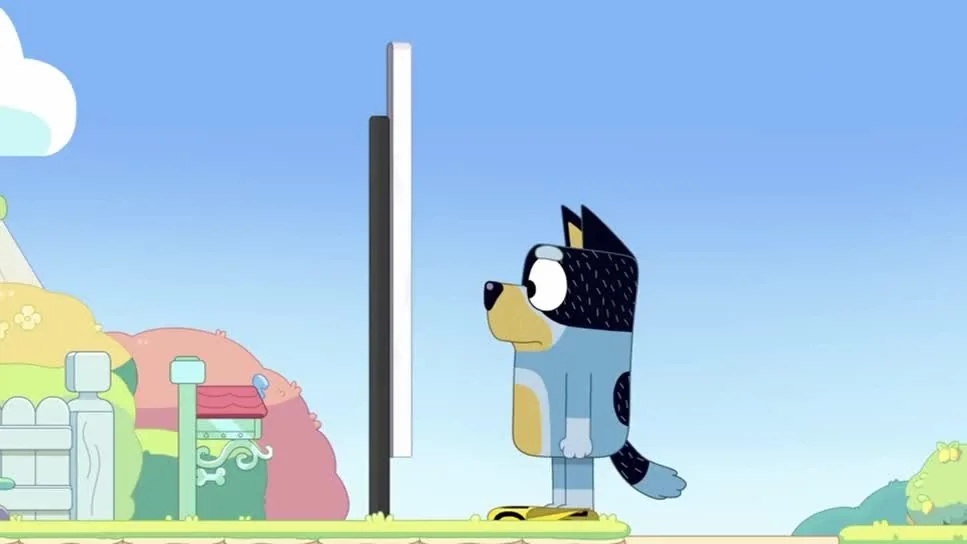
In the final moments of the episode, the family that was planning to buy the house cancels the deal after finding a home they like more (it has a pool, you see). Bandit, taking this as “A” sign, rips “THE” for sale sign out of his yard and tosses it aside just before he’s tackled by his wife, who is sobbing with joy and adoration.
THIS IS A SHOW THAT IS OSTENSIBLY FOR PRESCHOOLERS.
Bluey is the most heartfelt show on television, and although there are several episodes that have left me in tears, there has never been one that left me unsatisfied. And for me, at least, it’s because in Bandit Heeler I see someone who I wish I could be, somebody I can be on my best days and someone I can turn to for strength on my worst days. And I’m not alone. Fathers all over the world have taken up Bandit as the role model we need – someone who loves his family unconditionally, is not afraid to express those emotions, and shows us that sometimes it’s okay to not be okay. We don’t have that. The world has told us for decades that we’re not allowed to be human, that feet of clay must be hidden, that we are to have no Kryptonite. Bandit tells us that’s BS, and because of that, there are a lot of dads reaching out to talk to other dads who understand that pressure the doctor told me about.
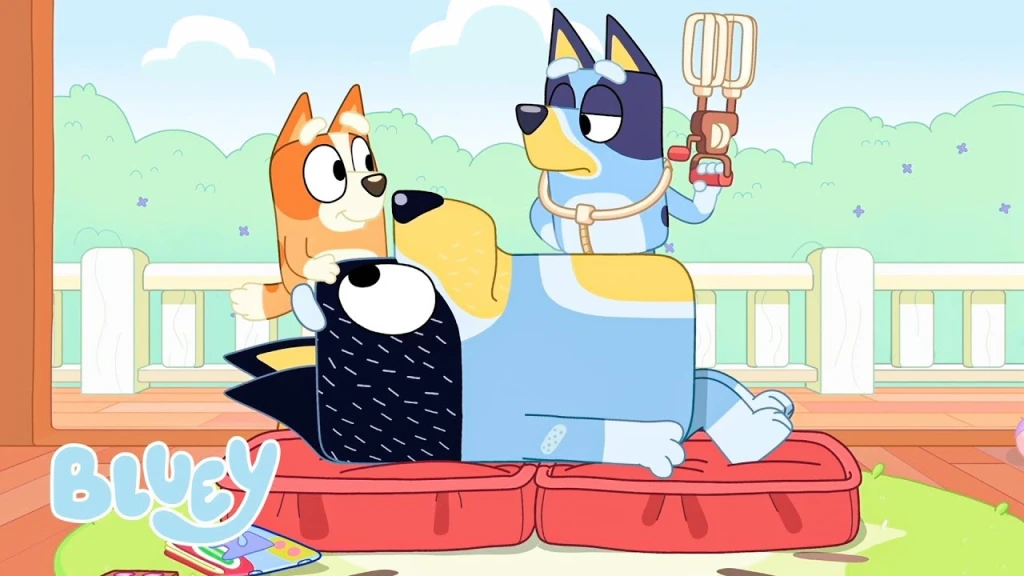
When Eddie was in the hospital, after the doctors told us that it wasn’t his appendix after all and that he was going to be okay, I felt awash with relief. I texted my own father and the rest of the family to let them know the news. I sent messages to concerned friends, to those English Teacher Friends I mentioned last week, and called my grandmother to let them all know that the cause for fear was over.
And then, because I’d been holding the emotion in for nearly 24 hours at that point, I got on Facebook and went to a group I’m in called “Bandits.” And I started to type. “Fellas, everything is okay now, but it’s been a rough night…”
Blake M. Petit is a writer, teacher, and dad from Ama, Louisiana. His most recent writing project is the superhero adventure series Other People’s Heroes: Little Stars, now complete on Amazon’s Kindle Vella platform, and hitting print on May 4th! He could write a dozen columns about how great Bluey is, but right now, he’s in a Bandit place.